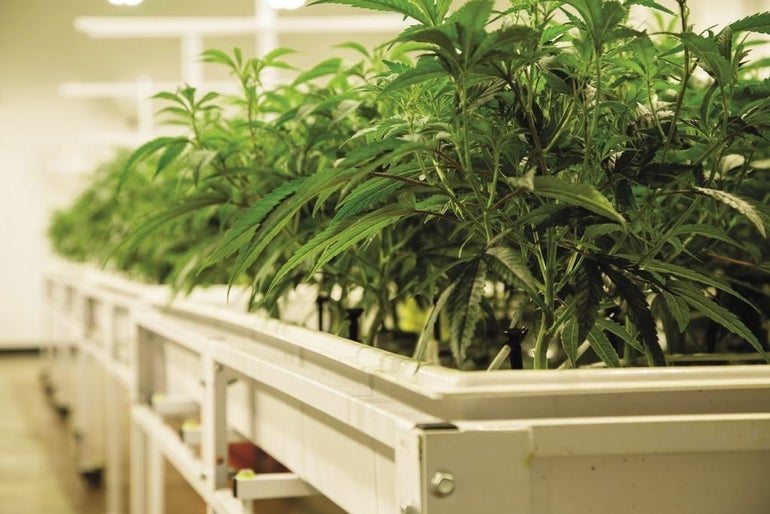It’s rare that the Democratic leaders of the House and Senate and Gov. Charlie Baker can agree on tax policy – particularly if the question is about raising taxes.
But should Massachusetts voters next month decide to legalize marijuana, there could be a script all three would be willing to follow that would lead to a higher tax rate on pot than the one proposed in Question 4 on the November ballot.
Senate President Stanley Rosenberg, an Amherst Democrat who supports legalization of marijuana for adult use, indicated Monday that he might be willing to go the farthest on marijuana taxation.
“We have to make sure we collect at least enough money to cover all of the expenses associated with regulating and licensing and enforcing the laws as they pertain to recreational marijuana,” Rosenberg told reporters after meeting with House Speaker Robert DeLeo and Lt. Gov. Karyn Polito. “We also need to make sure we have enough funding to deal with addiction and the public health concerns as well as public safety. When all of that’s done – and I’m not convinced yet that the rate that’s in the proposed law is sufficient to cover all of those expenses – but assuming we reach the point that the voters pass it and we now know we need have a rate that will cover all of that, I’m open to going beyond that as well and would raise that with my colleagues.”
The ballot question proposes a 3.75 percent excise tax on marijuana that would be added to the state’s 6.25 percent sales tax, effectively taxing pot at 10 percent to start. Cities and towns would have the ability to add an additional sales tax of up to 2 percent on top of that.
At 12 percent, Massachusetts would still have the lowest marijuana rate of any state that has legalized the adult use of the drug. Colorado taxes marijuana at 29 percent, Washington 37 percent, Oregon 17 percent and Alaska 25 percent, according to the Tax Foundation.
“I think there would have to be a discussion not only on that issue, but on a whole host of issues, although it is my sincere hope, obviously, that it does not pass,” said DeLeo, a Winthrop Democrat. “I would think that should the voters decide on passing it I think anything and everything would be on the board in terms of whether it’s taxation, whether it’s regulation or whatever it may be.”
DeLeo said that if voters do approve Question 4 on Nov. 8 he would not be inclined to call legislators back into session before January to consider immediate changes to the new law.
Question 4 campaign organizers have estimated that the tax scheme laid out in the ballot question would generate up to $100 million annually for the state. They say that’s enough to regulate the new industry.
Lt. Gov. Karyn Polito, speaking for the administration with Baker in New York City, questioned that position. She and Baker have campaigned against Question 4, but should it pass Polito said she has doubts about whether the 3.75 percent tax rate would be sufficient to cover the state’s expenses.
“This is a new industry and compared to other states like Colorado the question, in our view, is flawed because it has a tax rate that in our view most likely would not cover the cost to regulate the industry,” Polito said.
Earlier in the day, in response to a television interview that aired over the weekend in which DeLeo said he would not hesitate to make changes to a voter-approved legal marijuana law, Jim Borghesani, spokesman for the pro-legalization campaign, urged lawmakers to evaluate the commission’s work before making changes to it.
“The concerns raised by Speaker DeLeo will likely be addressed by the Cannabis Control Commission when they write these regulations, so I would suggest that the Legislature wait and see what regulations are actually written, and then if they want to address it at that point they certainly can,” Borghesani told the News Service.
On the tax rate in particular, Borghesani said, “We mandate that the Cannabis Control Commission make tax recommendations to the Legislature each year, so I think consideration should be given to letting it play out for a little while before determining that it needs some alteration.”
Treasurer Deborah Goldberg would oversee the proposed commission and recently said that when it comes to taxes on marijuana “the higher the better.”
Despite recent polling showing voters appear ready to approve legal marijuana for adult use on Nov. 8, Polito said she and the governor remain “very much opposed” to the question and will continue to urge voters to reject the ballot question.
Polito did, however, seem to take a similar position to the one Baker has carved out on taxing new technologies such as Uber and AirBNB when asked whether raising the tax rate would violate the spirit of the administration’s no-higher-taxes stance.
“This is a whole new industry that would be introduced to Massachusetts, opening up the edible retail shops, home growing of marijuana. This is a whole new landscape and would change the culture and we would have to take a look at all of that,” Polito said.

